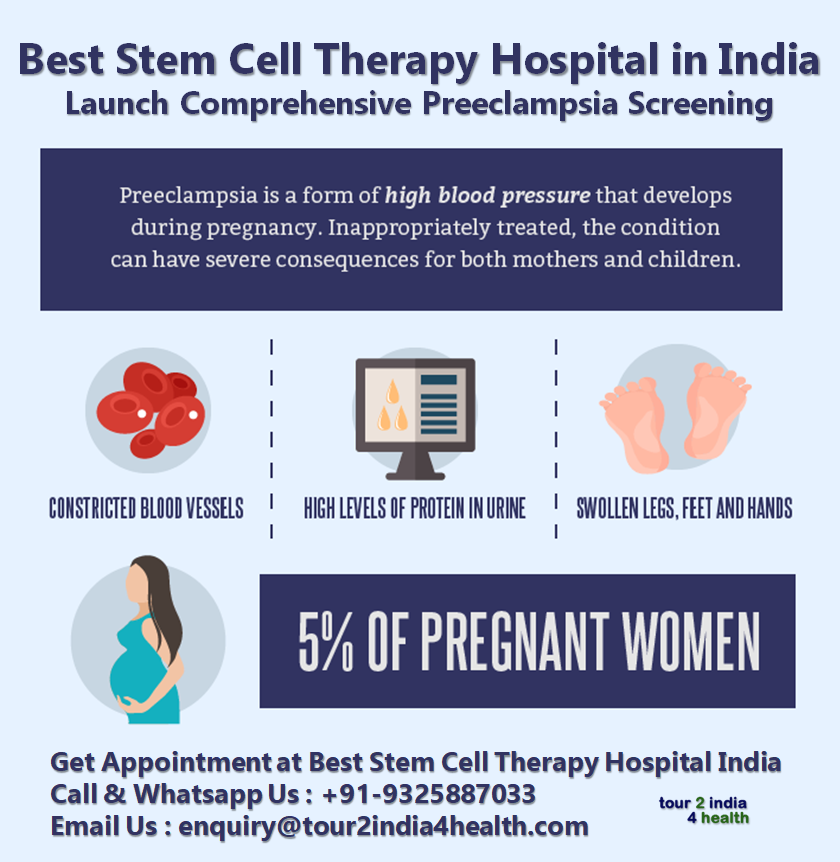The addition of a new biomarker to the screening panel permits detection of late due-onset preeclampsia within the third trimester.
Stem cell therapy in India to offer screening for both early-onset and overdue- onset preeclampsia for the duration of pregnancy, this launch is an extensive milestone as the presently available diagnostic available test only for early-onset preeclampsia. Best stem cell therapy hospital in India has previously added the first-trimester preeclampsia screening based on detection of placental growth factor (PIGF) ranges. but, the addition of some other vital biomarker, sFLT-1 (soluble FMS-like tyrosine kinase-1) in the screening panel will allow the prediction of preeclampsia and assist in accurate diagnosis even in the 1/3 trimester.
Preeclampsia, an extreme complication off pregnancy, impacts 8-10% of Indian women and is characterized via high blood pressure that could damage major organs. Moreover, it can also result in slow or confined growth of the fetus, preterm birth, and stillbirth, low start weight or maybe prove fatal. Late-onset preeclampsia takes place in approximately 75-80% of all instances of preeclampsia and is associated with maternal morbidity (metabolic syndrome, impaired glucose tolerance, weight problems, dyslipidemia, continual hypertension), as well as regular delivery weight and placental volume.
Stem cell therapy in India’s comprehensively designed preeclampsia screening assessments adheres to protocols defined by the fetal treatment foundation and the national institute for health and care excellence (NICE). Moreover, the tests presents provides Best stem cell therapy hospital in India at reliable effects based on the biochemical markers along ultrasound findings and the mother’s medical history. The early-onset preeclampsia screening test is performed along of blended first-trimester screening (CFTS) to evaluate the tiers of PIGF in the mother blood. As the ASPRE trial tested, the early detection of preeclampsia the usage of CFTS may be managed with the administration of low-dose aspirin in high- risk women, reducing the risk of preterm preeclampsia by means of extra than 60%.
Moreover, stem cell therapy in India’s overdue-onset preeclampsia screening evaluates a one of a kind biomarker, sFlt- 1. In women’s who develop pre-eclampsia, the levels of sFlt- 1 are thought to be higher than those seen in normal pregnancy. The screening for late-onset preeclampsia, as a consequence, measures the sFlt- 1and PlGF ratio which effectively allows same of low-threat pregnancies which are at a high danger of developing preeclampsia.
Doctors performing stem cell therapy India said, “Preeclampsia is a pregnancy-specific difficulty leading to maternal high blood pressure and multisystem issues which can be life-threatening to the mom as well as the fetus. On account that Best stem cell therapy hospital in India for this condition is in the end turning in, it stays an important cause of iatrogenic prematurity. Reducing the occurrence and/or severity of preeclampsia can improve perinatal health drastically. Women who've preeclampsia are at higher chance of medical issues in later life and as a consequence screening and prevention of preeclampsia in pregnancy is a very vital fitness intervention".
Consultant Sonologist & fetal medicine specialist performing stem cell therapy, “India is the stillbirth capital of the world. Preeclampsia is an important reason of death and complication for the mom and baby. Screening for preeclampsia at eleven-thirteen weeks can become aware of about ninety% of women who increase early preeclampsia and administration of Aspirin, 150 mg/day reduces the rate of early preeclampsia by about 90%. It’s far strongly recommended to offer preeclampsia screening to our potential mothers.”
This new addition in the testing suite of Best stem cell therapy hospital in India will bolster its dedication to offer relevant and dependable test results that not only help doctors make the proper medical decisions however also improve maternal and newborn health.
Read More - Stem Cell Therapy in India Giving New Hope to Numerous People






No comments:
Post a Comment